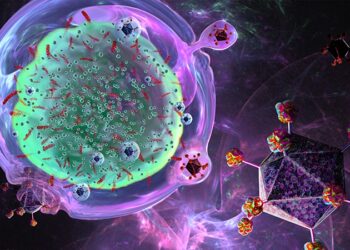MANCHESTER — Thousands of people in the United Kingdom with advanced heart failure are not being referred for potentially life-saving treatments, a leading heart transplantation expert said at the British Cardiovascular Society Annual Conference 2025.

Owais Dar, a consultant cardiologist at Harefield Hospital, Guy’s and St Thomas’ NHS Foundation Trust, London, described a “systemic failure” in delivering transplants and left ventricular assist devices (LVADs) to eligible patients in the UK.
This failure was leading to a “deadly delay” in care, he said.
Presenting data from a National Advanced Heart Failure Audit, Dar estimated that 10,000 adults under 65 who could be eligible for a heart transplant or LVAD therapy had not been referred to specialist services.
Furthermore, 130,000 adults with advanced heart failure were living with palliative care needs.
“If this was a cancer, we would be furious about this,” said Dar, who is also an honorary senior lecturer at King’s College London. “We’ve got young people here who are not accessing [these therapies].”
Dar noted wide variation in referral patterns. Even in regions with the highest rates of referral, the numbers fell short of what was needed. “Generally, within the UK and Ireland, we’re just not thinking about transplant or LVAD therapy as even an option,” he said.
Specialist Services at Risk of Being Overwhelmed
Geraint Jenkins, a consultant cardiologist at Morriston Hospital in Swansea, Wales, told Medscape News UK, “The majority of the patients these days — because medical therapy is so good — get better.”
He observed that half of patients with an ejection fraction under 30% regain nearly normal heart function within a year, “and they don’t get anywhere near a transplant centre.”
Jenkins warned that current referral criteria were “lax” and, if followed, could overwhelm specialist services.
“We’ve got thousands of patients with ICDs [implantable cardioverter defibrillators], and the number of patients having ICD shocks every month is quite substantial,” he said. “If they all went to Harefield for assessment, that would swamp their services.”
Jenkins stressed the importance of identifying the right patients at the right time, which meant finding the “sweet spot” for patient referral. “That’s what we’re not doing well,” he said.
LVADs Offer Alternative Solution
Separately, Dar told Medscape News UK that while there may not be enough hearts to match presumed demand, modern LVADs were “almost as good” an alternative.
LVADs are mechanical pumps that support circulation in patients with severely weakened hearts. They can be used for long-term support or as a bridge to transplant.
Theoretically there were “unlimited amounts of LVADs,” Dar said. As these were “off-the shelf” items, the waiting time should be shorter than for an appropriate organ donation.
Many patients already had access to other advanced treatments like ICDs and cardiac resynchronisation therapies (CRTs), he added. “The only option they have is an operation that can allow them to live another 8 years.”
He emphasised the benefits for younger patients: “That’s giving them back quality of life, where they can work again, exercise, and do things again — going from being bedbound and possibly dying within a year.”
High Mortality in Advanced Heart Failure
Dar said advanced heart failure carries significant mortality risk. One-year mortality is around 40% using European Society of Cardiology (ESC) criteria, and 20% with American Heart Association benchmarks.
Based on US data, around 14% of a population of around 60,000 met ESC criteria for advanced heart failure, with 5% “within transplantable age” from 18 to 65, said Dar.
Extrapolated to the UK with a total population of 68 million, 1 million would have a diagnosis of heart failure, 140,000 would have advanced disease, 50,000 would be under 65, and 10,000 eligible for transplantation or LVAD therapy.
A “feeling that we were not getting enough referrals” had led Dar and other transplant physicians across the UK and Ireland to form a working group to look into the issue.
The aim was to create a heatmap of referrals that had been made to heart transplant and LVAD centres and assess inequality and equity of care.
Audit Exposes Regional Inequalities
The working group audited 4 months of referral data, including 416 patients with a median age of 52. Most were men (67%) and White (73%), with a nonischaemic cause of heart failure (55%).
In 44% of outpatient referrals and 17% of inpatient referrals, patients were considered “too well” for transplant or LVAD. Respectively, 29% and 39% had contraindications to either option, with 19% and 31% progressing towards a transplant or device fitting.
High body mass index was a key exclusion factor, alongside liver or kidney failure, diabetes-related organ damage, or smoking.
The audit found significant regional variation — a “postcode lottery” in access. “There are large areas, particularly in Wales and the Northeast of England, that are simply not referring patients with advanced heart failure — for transplant or LVAD therapy,” Dar noted. Even areas around specialist transplant centres were not referring patients, he added.
Calls for a National Referral Pathway
“It’s affirmed what we suspected,” Dar told Medscape News UK. “So, I think the idea now is to speak to NHS England and colleagues to try and address this inequality and raise awareness of it to see how we can improve things.”
One approach, he suggested, might be to create a national pathway that sets out how quickly someone with suspected advanced heart failure was seen by a specialist team.
Jenkins observed that travelling to specialist centres could be a problem for many patients living in more rural areas who could face long journeys. He suggested that specialists could perhaps hold monthly clinics within existing heart failure centres.
Whatever the reason for the lack of referrals, Dar said it was clear that more needed to be done: “We’re failing these patients. Speak to your local transplant centres about your patients and just have that conversation early on.”
Dar and Jenkins declared no relevant financial relationships.
Sara Freeman, BSc, MSc, is a freelance medical journalist based in London, UK. She has been reporting for specialist healthcare news organisations for more than 20 years.
Source link : https://www.medscape.com/viewarticle/thousands-missing-out-life-saving-heart-treatments-2025a1000f34?src=rss
Author :
Publish date : 2025-06-04 18:32:00
Copyright for syndicated content belongs to the linked Source.













